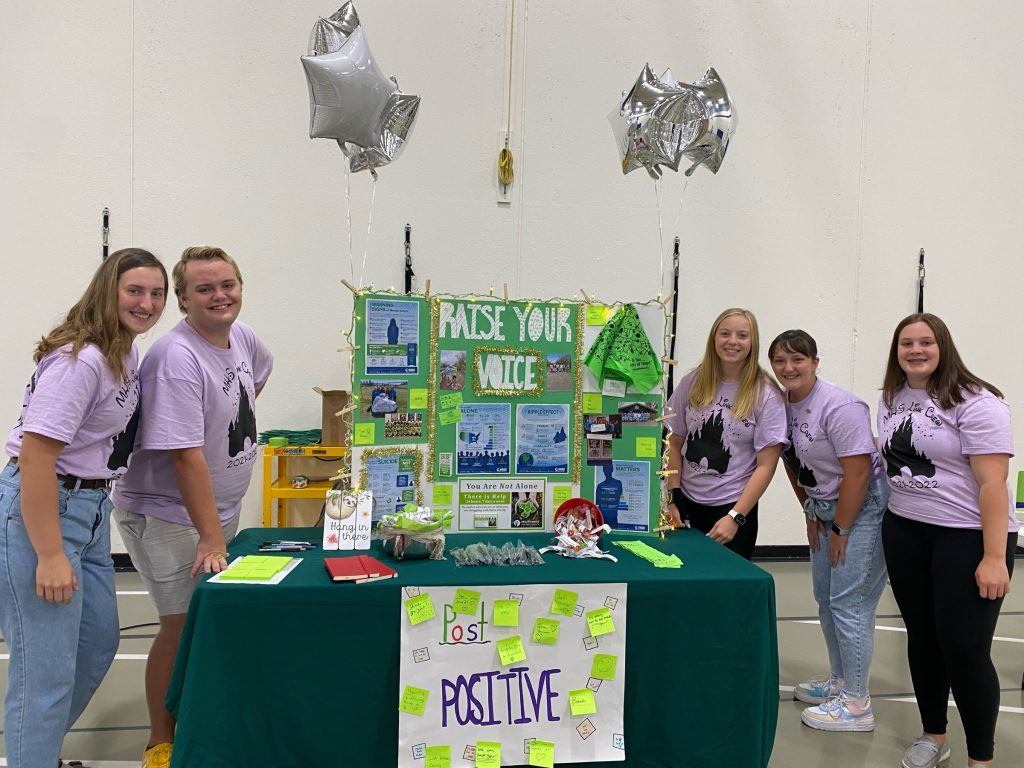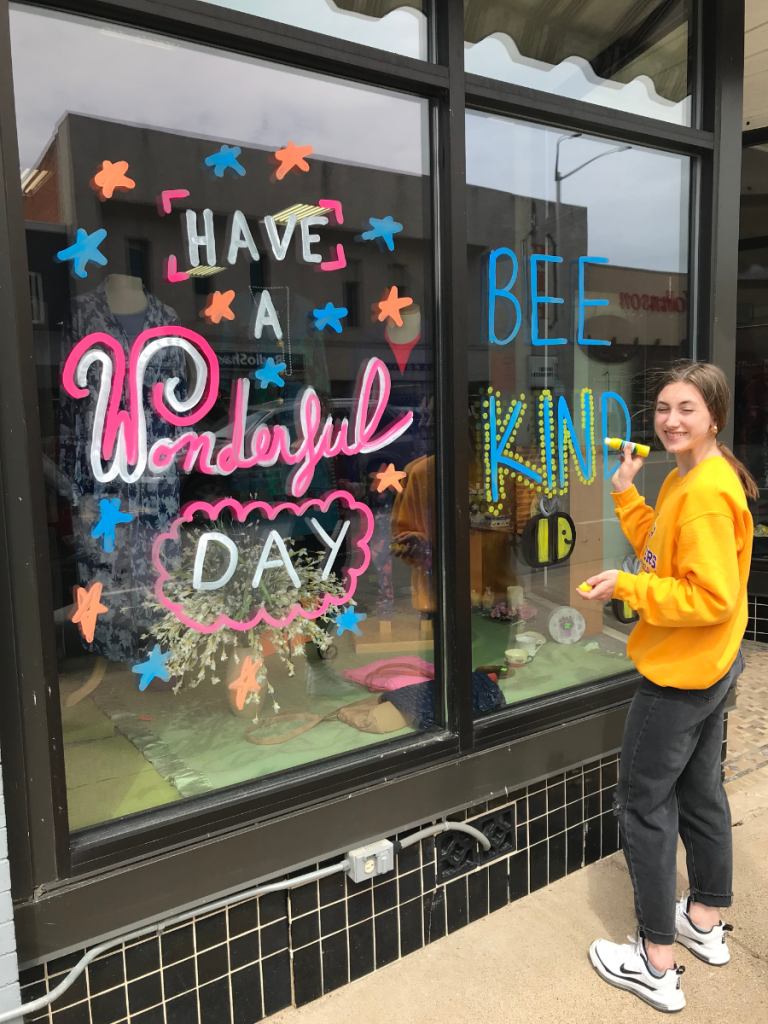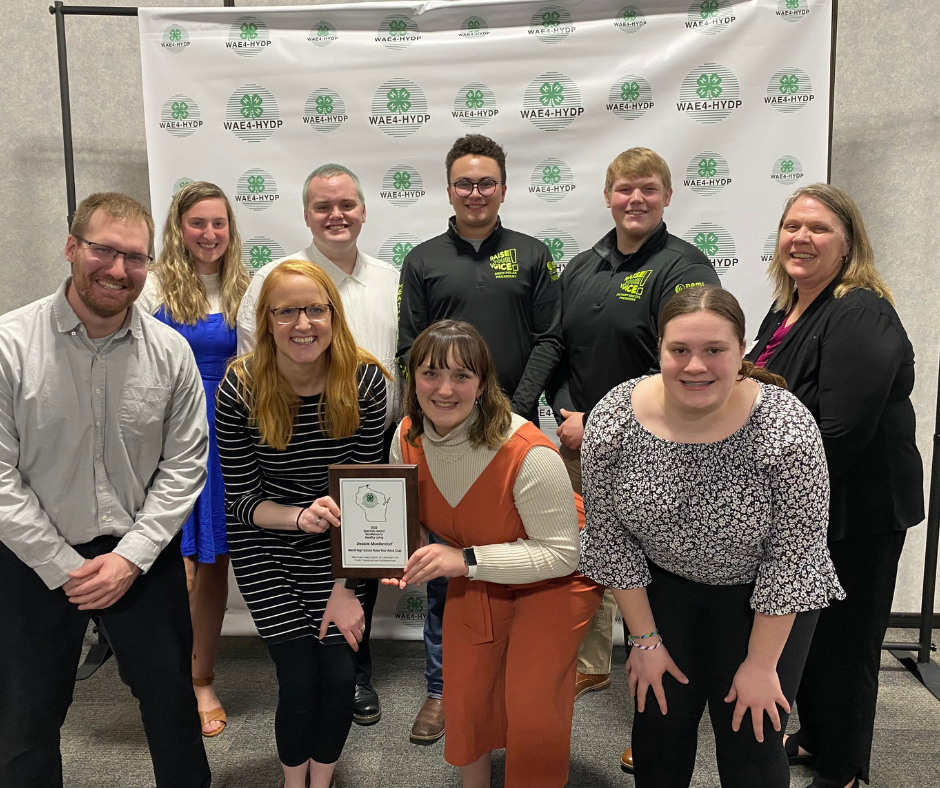Before becoming an anthropology student at UW–Madison, Decilyn Clark was part of the Raise Your Voice Club at Merrill High School. “I joined Raise Your Voice my sophomore year after COVID because things were getting a little weird around that time,” said Clark. She initially signed up because she was a mental health advocate and wanted something to put on her college application, but she quickly realized how important the club was. “I had friends and people in my life very close to me that I did not realize were struggling with mental health as much as they were.”
Mya Wilde was also a member of the Raise Your Voice Club at Merrill High School. Being in the club is a big reason she is now a psychology major at UW-Eau Claire. “I showed up to the first meeting with some friends and it kind of grew into my passion, honestly,” she said, “I kind of dove right into it. I liked what it stood for. I was struggling myself and helping others was a way for me to express that.”
Youth mental health has been a growing concern in Wisconsin with 1 in 5 youth ages 14-24 living with a serious mental illness and suicide being the second leading cause of death for people ages 10-34. Raise Your Voice is a youth-led program that hopes to change that.

Starting a Raise Your Voice Club at Merrill
Raise Your Voice, a program created by the National Alliance on Mental Illness (NAMI) Wisconsin, aims to end stigma surrounding mental illness by 1) raising mental health awareness, 2) promoting mental health resources, 3) developing youth advocates and leaders, and 4) empowering students to talk about mental health and seek the help they need.
When Debbie Moellendorf, professor and Health & Well-Being Extension educator (Lincoln County), first heard about Raise Your Voice Clubs, she brought the idea to Allie Libby, School Counselor at Merrill High School. “I knew that she was very interested and recognized the need for more mental health resources,” said Moellendorf, “She’s also a person that really believes strongly in youth leadership opportunities.” Because Raise Your Voice combines leadership development with increasing mental health support within the school, Moellendorf knew the idea would resonate.
And it did. For a school with over 800 students, Libby said it was getting more difficult to support the mental health needs of students. Furthermore, studies show that students tend to go to peers first when they are struggling. Libby saw Raise Your Voice as another way to help students. “If we can help equip students with some basic skills and interventions to be able to support their peers and reach out to the appropriate help, that really can change the culture of our school,” said Libby.
With the help of Adam Yirkovsky and Katy Holz, teachers at Merrill High School, and the support of community partners including Aspirus Health, who provided funding, and NAMI Northwoods, who provided curriculum support, Merrill’s Raise Your Voice club kicked off during the 2020-2021 school year. After three years, it’s still going strong.
Developing youth advocates and leaders
Raise Your Voice clubs are based on the theory that youth have the power to change the community when they are given the opportunity to voice their ideas and help shape solutions. Adults involved in Raise Your Voice clubs are there to offer guidance, but they let youth make decisions. “Debbie taught me this many years ago that it’s not to them, it’s not for them, it’s with them. Everything that we do- we have to be doing these initiatives with them. I think that that’s the main reason why it has been so successful because it’s really about listening to their perspective and empowering them,” said Libby.
Kindness Week was one of the youth-led initiatives organized by Merrill students. The club had a table during lunch called the “Appreciation Station,” providing students the opportunity to send a kindness note to anyone in the school. More than 200 kindness notes were distributed that week. “People had so many nice things to say to other people and they jumped at the opportunity to do this. People were asking, ‘When are we doing this again?’” said Clark. She said the response was so positive partly because Kindness Week was youth-led rather than something teachers told students to do.
Educating and empowering youth
Merrill’s Raise Your Voice club included educational opportunities that empowered Clark. “It really helped me and other members realize that our friends were struggling. We were able to get them the help they needed, which was really cool,” said Clark.
One of the most impactful activities was the Bandana Project. Libby and Moellendorf developed a curriculum for club members that included mental health basics such as different diagnoses, warning signs of suicide, what to do if a friend says they considered suicide, and resources within and outside school. Moellendorf said they intentionally created the training to make sure that youth understood their role. “We are very clear that it’s not your job to be the counselor, not your job to be the therapist. But you can help a friend or a peer get connected,” said Moellendorf.
Everyone who completed the training received a bright green bandana to wear on their backpacks, signaling that they were a safe person to talk to if a student was in need of support. In the first year, 56 members went through the training and wore their bandanas. In the second year, the project grew to 89 students.
Because of the Bandana Project, there were several situations where students were instrumental in getting help for their peers. Libby said that one club member in the Bandana Project noticed signs that their friend was not feeling right. The club member asked more questions and then took the situation to a trusted adult who was able to connect the friend with a counselor. Because of that connection, Libby said the friend received inpatient hospitalization, “So it was a significant thing that they were really struggling with, in terms of their mental health- and since then has been doing a lot better. That was a really cool opportunity for, not only the student who was given the support, but also the student that offered the support.”
Raising awareness and reducing stigma
As one of the goals of Raise Your Voice clubs, students planned awareness events throughout the school year, including a community-wide awareness walk. Organizing the walk was a powerful experience for Clark because it was a chance for the club to reduce stigma throughout the entire community. In addition to walking together, students painted downtown windows and placed painted rocks throughout the community with positive messages for people to see. Clark sees the walk as a way to let older residents know that it’s ok to talk about mental health. “Maybe they’ve been feeling this way the whole time and now they’re like, ‘Ohh. There’s an actual town event for this. Maybe this is OK to talk about,” said Clark.
Wilde agreed. “The more you get it into the community and the more it’s talked about there, that helps so much. Especially when youth are trying to show what the world is now, what the attitude is towards mental health and mental illness today. And I feel like having that community event where everybody can realize that and be there together is super cool,” said Wilde.

Changing the school environment
Based on participation alone, the club is meeting a need. Over 50 students attended the first meeting held in 2020, and every year the club has had over 100 student members (in a school of 800). They aren’t just joining, they are participating, with 75-90 students attending every meeting and 72% of club members reporting that they have supported a friend or peer who was struggling.
For Libby, the biggest change she has seen is a shift in the culture of acceptance- students are more willing to talk about mental health. “The stigma around it has really, really shifted. Kids are willing to talk about it. They have language around what they need to say. They are able to communicate about how they’re feeling,” said Libby.
Addressing youth mental health in communities
According to Danette Hopke, Extension’s Behavioral Health Outreach Program Manager, mental health resources are a growing need in communities throughout Wisconsin. Data from the 2021 Wisconsin Youth Risk Behavior Survey indicated that 55% of high school youth reported they have had problems with anxiety and 18% had seriously considered suicide. It’s a growing concern for Wisconsin communities, with 30 county health departments identifying adolescent mental well-being as a priority for their Maternal Child Health Title V block grant funding.
Hopke says that interventions focused on increasing protective factors are a positive way that communities can influence youth mental health. Helping youth develop good coping and problem-solving skills and providing opportunities for youth to build connections with peers and trusted adults, both inside school and out, can help reduce the risk of youth mental health concerns.
Hopke would like to see youth included in decision-making and planning at all levels. “Youth voice is important in all spaces related to youth mental health,” said Hopke, “If it’s in a school, if it’s in the community, if it’s in an assessment process, youth voice and engaging youth is important.” Programs such as Youth Advocates for Community Health and Raise Your Voice clubs provide youth with the opportunity to help address health and well-being needs for themselves, others around them, and their communities. Youth are supported by adults but are encouraged to make decisions, solve problems, and work together to bring their ideas to life. Programs that center around youth engagement and youth voice also develop leadership skills so that youth will be prepared to advocate and lead in a variety of ways throughout their lives.
Extension partners with local organizations and health departments to expand the resources and enhance the capacity of local behavioral health professionals and supports. “In order for us to be able to strive toward long-term change in any space, we have to build capacity in communities,” said Hopke. By providing curriculum, technical assistance, and support, more communities have the resources and confidence they need to engage and support youth and adult mental health and well-being.
Leaving a legacy of impact
Moellendorf, a professor within the Division of Extension who retired this June, spent her 35-year Extension career working with youth, as a 4-H Positive Youth Development Educator and then as a Health and Well-being Educator. Reflecting on her work with youth, Moellendorf said working with the Raise Your Voice club was the highlight of her career, “Young people do care about other young people, they do care about making a difference and when you give them the opportunity, they can make a difference. They just need the support of adults, and sometimes, for adults to get out of their way and be a resource and a support system to them.”

Based on the impact of Merrill High School’s Raise Your Voice club, Moellendorf and Libby have worked closely with NAMI Northwoods to support the start of more clubs in the region. As of June 2024, eight schools in Lincoln, Langlade, and Marathon counties will have their own Raise Your Voice clubs.
Libby gives a lot of credit to Moellendorf. “None of this would have happened if it wasn’t for her. She’s the first person that came to me and said, ‘Hey, what about this?,” said Libby. “She had so many valuable community partnerships and connections that she was able to get us funding. She was able to do so much for us and just had such a positive impact.”
——————————
For information about how you can support youth, visit extension.wisc.edu/supporting-youth/
If you or someone you know is in crisis, contact the 988 Suicide & Crisis Life Line for support and resources.



